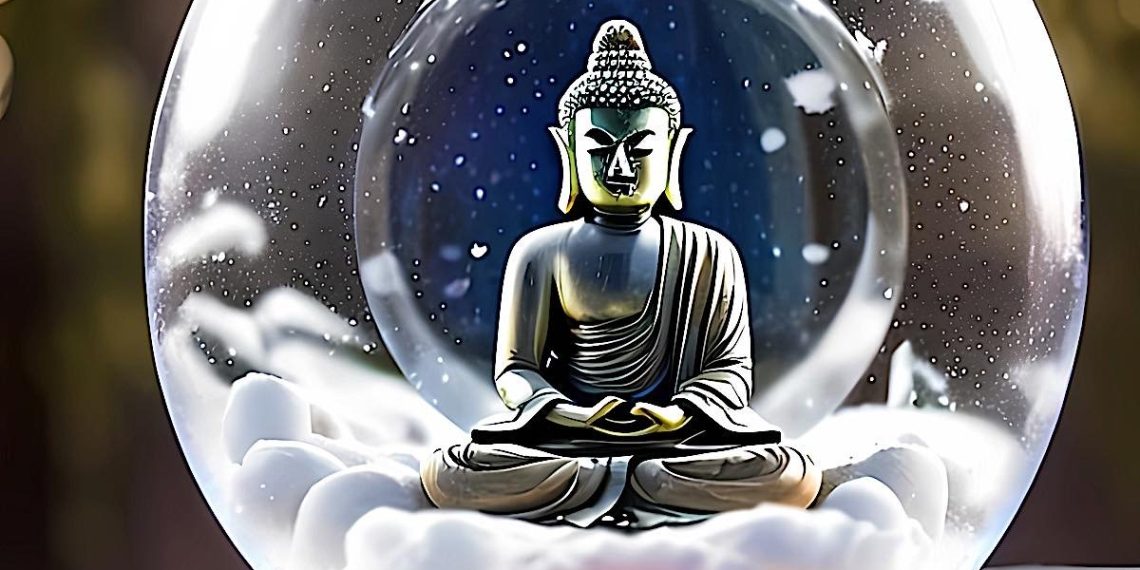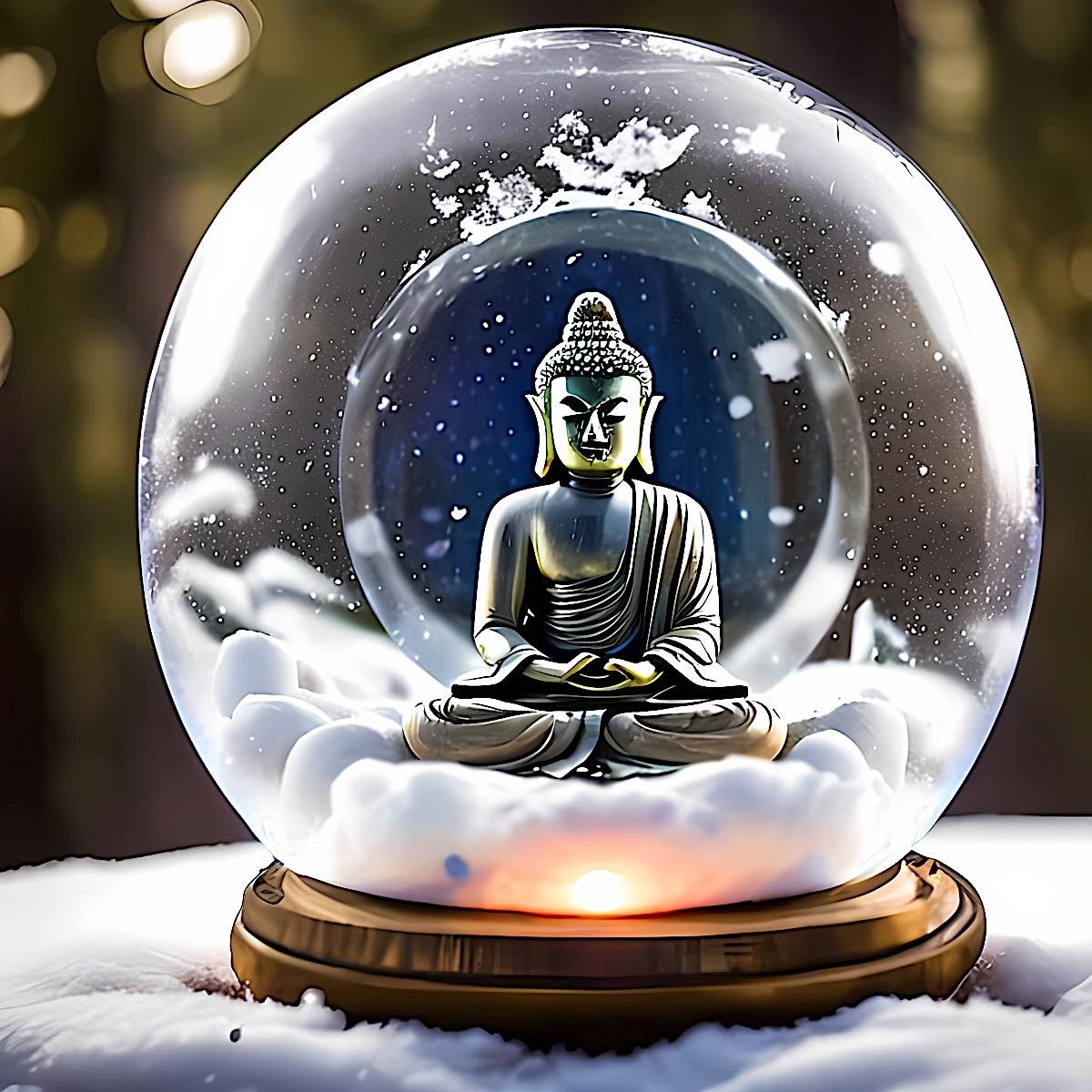
New contributing writer Mark Tursi’s insightful commentary on the contrasts and connections between Zen Buddhism and Western Philosophy, starting and ending with a powerful “snow globe” metaphor:
Shake it and there’s an instant snow squall like our minds: a dizzying array of swirling thoughts. When the snow settles, we see the scene again with intense clarity.
By Mark Tursi
Snow Globes & a Mind of Winter
“One must have a mind of winter,” writes Wallace Stevens in his poem, “The Snow Man,” and, later in the same poem: “For the listener, who listens in the snow, / And, nothing himself, beholds / Nothing that is not there and the nothing that is.”[1] This poem has a paradoxical quality similar to the contradictions and ineffability often attributed to Zen Koans that have become emblematic of the Lin-chi (or Rinzai) tradition in Zen Buddhism. The symbol of ‘the mind of winter’ is an apt metaphor for the idea of ‘no-mindedness’ (mushin no shin): a mind free of thought or, more correctly, a mind free from the clutter of the restless, discursive, judgmental mind. Stevens is onto something here: a peaceful winter scene is indeed a compelling metaphor for a quiet mind. But how about something a bit more artificial, say, for example. . . a snow globe? Imagine a quaint miniature scene with tiny snowmen, evergreens, perhaps a tiny sleigh pulled by horses, and maybe even a few miniscule Christmas carolers. Give it a shake and the artificial snowflakes float wildly around the crystal-encased world. Then set it down and observe as the tiny flakes begin to settle slowly to the bottom of the globe. If you can conjure this image in your mind, you might be on your way to seeing the practice of Zen more clearly – at least on a figurative level.
So, how is it that a Christmas tchotchke can help us understand an ancient meditative practice that began in China (via India) more than 2,000 years ago? I first encountered this ‘snow globe comparison’ many years ago at an introductory Zen workshop led by Roshi Bodhin Kjolhede, former Abbot of the Rochester Zen Center (RZC) and Dharma-heir of Philip Kapleau, founder of the RZC and author of The Three Pillars of Zen. The snowflakes represent thoughts: the restless, distracted mind. The practice of Zen is a way to quiet and pacify that mind: to settle the blizzard of distraction and allow for clarity, focus, mindfulness, concentration, and the seeming paradoxical quality of mental acuity plus a calm mind.
At the time, this image really resonated, but it also created a tension in my mind. I wondered if the idea to quiet the mind implied that thoughts were the ‘enemy’ of Zen? What is philosophy if not thoughts? If we accept the famous French philosophical duo, Gilles Deleuze and Felix Guattari’s definition that philosophy is ‘the creation of concepts,’[2] then it would seem that philosophy is, if not a hostile adversary to the practice of Zen, then possibly some kind of powerful symbolic foe or nemesis. If that’s the case, my future in Zen was off to a very shaky start. As a college professor of the humanities, philosophy—along with literature and art—is both my ‘bread-and-butter’ and also a lifelong passion. Is the pursuit of philosophy diametrically opposed to Zen? Was I doomed to fail in Zen practice before getting started?
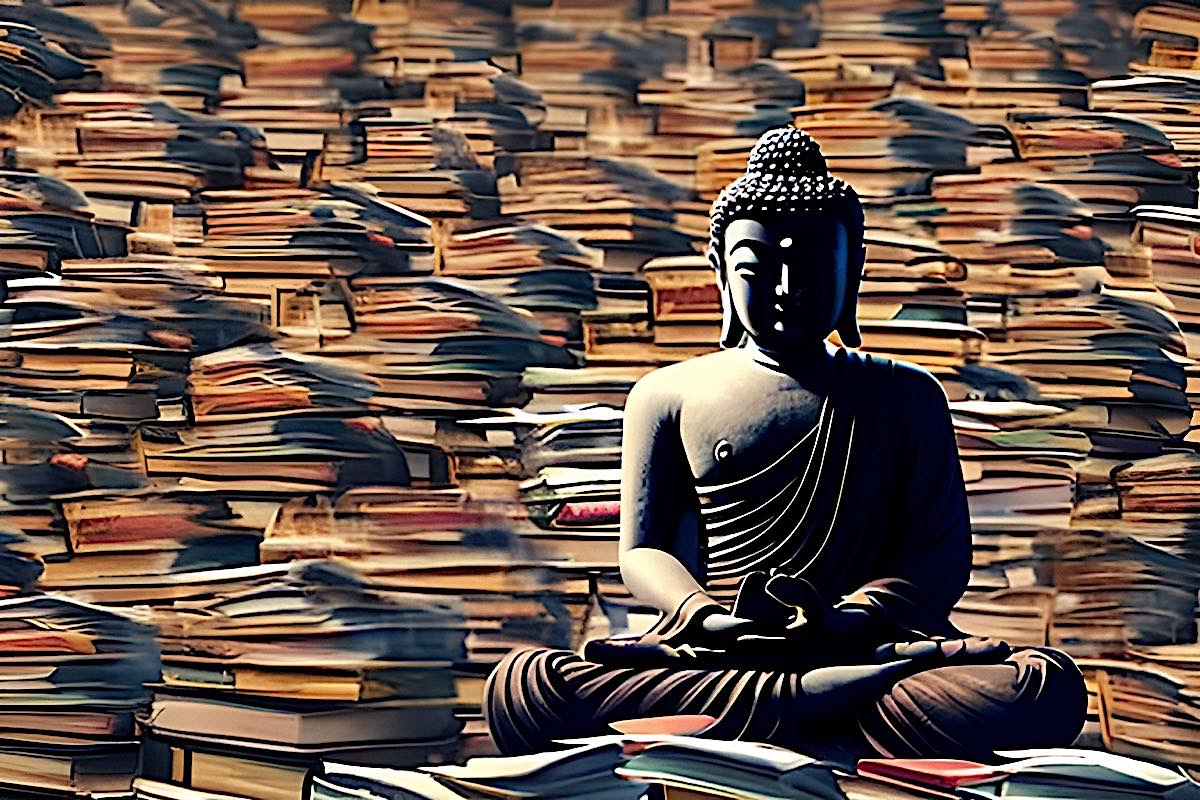
Different Types of Wisdom — and the Irony of so Many Books on Zen
Early in my practice, it seemed awfully ironic to discover that more books have been written about Zen than any other Buddhist sect. Add to that many prominent teachers who claim that the practice is beyond words.[3] This is revelatory on a number of levels, not least of which is the recognition that the practice itself is challenging. When human beings encounter a challenge, they often rely on reason, rationality, science, or some other evidence-based inquiry to find a way through. Ergo a lot of books about Zen. But, according to the Zen masters, this is a mistake. Here is Philip Kapleau on this very point:
True wisdom, in the end, consists in the ability to read unwritten books. Nietzsche wrote that when his eyesight became so poor that he could no longer read books, he began at last to read himself.
Reading and zazen do not generally complement each other. Long stretches of reading, especially of facts and theories, tire he brain and enervate the body, paralyzing the desire for zazen. After zazen, on the other hand, your mind will feel so clean and alert that you won’t want to cloud it with reading of any kind.[4]
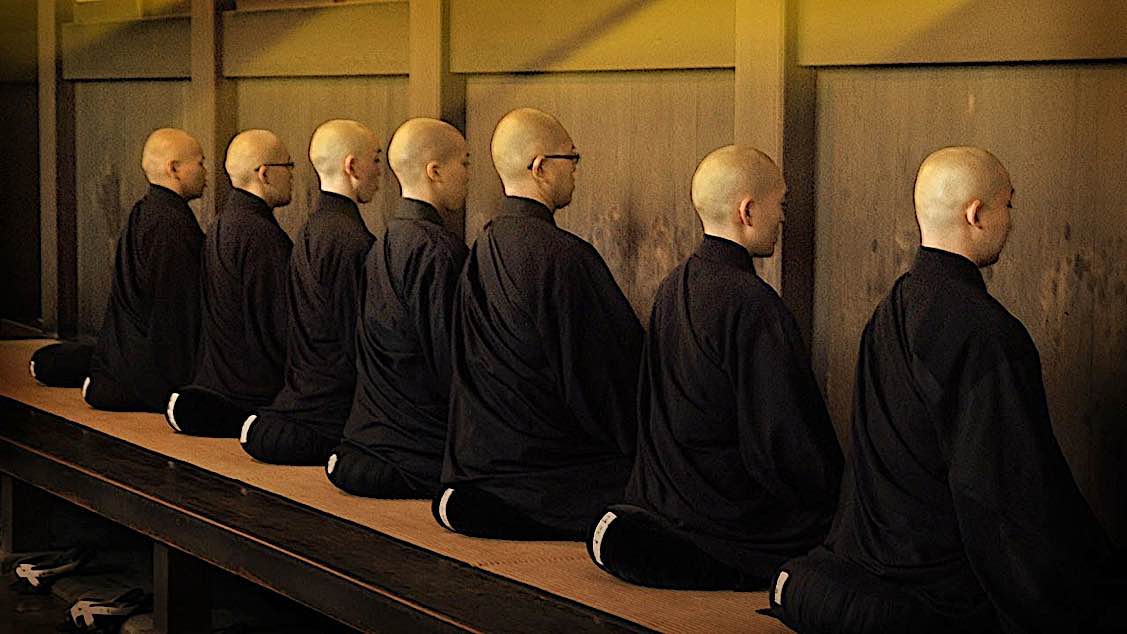
Zen and Paradox
Zen is strewn with paradox and contradiction, and most of it, ostensibly, is deliberate. Koans and other metaphors and narrative anecdotes are often intended to teach a lesson, provide some kind of clarity, or bring about awareness. The above passage is no exception as it is ironic on a number of levels: first that Roshi Kapleau references Nietzsche—one of the most well-known Modern philosophers whom he undoubtedly read—while simultaneously suggesting that reading and Zazen are not complementary endeavors, and, second, it suggests that Nietzsche himself experienced a kind of shift in awareness only after a lifetime of reading philosophy. Was it a Zen-like awareness, I wondered as I read this passage from one of Kapleau’s other books, Zen: Merging of East and West.
Paradox is woven into the very tapestry of Zen’s history. Famous for these bizarre and seemingly cryptic stories, Zen masters have often employed perplexing scenarios to “throw sand in the eyes of the discriminating intellect”[5] and force students to open their Mind’s Eye. In other words, they are intended to jar students into seeing and ‘knowing’ in another way that is not dependent on reason and rationality. In Zen training they are meant to induce an intense level of doubt in a student, which ostensibly will help them ‘to cut through’ conventional thought and culturally conditioned descriptions of reality and, thus, see into their true nature in order to bring about an awareness of ‘ultimate reality’ and one’s ‘true nature.’ It is a confounding inquiry into the nature of human experience; the supposed ‘dis-logic’ is meant to ‘shake’ students loose from their conventional way of thinking as to access a fully awakened state.
So, in this formulation, philosophical inquiry—in the traditional western sense that relies on reason, logic, and rationality (aka the discriminating mind)—would be of no use. In fact, the act of questioning and the exploration of the Koan is not in the brain, as it were, via the faculty of reason at all. Rather, it is in the Hara or the Tanden, which in Buddhism is regarded as the body-mind’s vital center. Though it seems to have no real ‘location’ in material reality, it is often regarded as an energy that radiates from the middle section of the body—the gut or the loins—though I believe this is more symbolic than somatic.

Roshi: “Philosophy is the study of human delusion”
Roshi Kapleau often quoted one of his earliest teachers, Harada Daiun Sogaku Roshi, who said that “philosophy is the study of human delusion” because, quite simply, it is the study of concepts. Harada Roshi seems well-poised to make such an assertion as he was not only famous for bringing together two major Zen schools—Stōtō and Rinzai—but he was also a professor of philosophy for many years. Roshi Kjolhede, quoted above and my own Zen teacher confirms this statement and has also referenced it in various Teishos or Dharma Talks to underscore the potential hazards and pitfalls in becoming attached to ideas and thoughts. It is a strong statement, especially for people like me who study philosophy and for whom it has been instrumental in shaping a worldview. It would appear, then, that studying philosophy—even Zen Buddhist philosophy—could hinder the experience of enlightenment and perhaps act as a profound obstacle on the path to understanding the true self. But, let’s have a closer look . . . .
The word philosophy is derived from the Ancient Greek philosophia (from philo- ‘loving’ + sophia ‘knowledge, wisdom’). So, philosophy is understood as the love of wisdom. But is this the same kind of wisdom as the wisdom in Buddhist thought known as Prajñā (from Sanskrit or paññā in Pāli)? Although Prajñā is often translated as ‘wisdom,’ it seems to me that a better translation is ‘insight,’ ‘non-discriminating knowledge,’ or ‘intuitive apprehension.’[6] More than simply etymological dissimilarity, however, Prajñā and ‘philosophical wisdom’ are dissimilar epistemologically as well: in philosophy, wisdom is acquired through reason while in Zen, Prajñā involves coming to knowledge via a direct experience of the thing itself: an actual encounter and engagement or awareness of ultimate reality, rather than through the rational faculty of mind. Instead of thought about the thing itself, you must experience the thing itself. In other words, you can’t discover ultimate reality by studying it; it must be encountered first-hand as some well-known metaphors in Zen teachings attempt to clarify: seeing the moon directly, rather than looking at someone’s finger pointing to it; or, the impossibility of eating a picture of a cake; and, finally, scratching an itch through one’s shoe.
In fact, of all the various Buddhist sects, Zen is the one that proclaims, most vociferously, that direct experience of one’s true nature is fundamental—i.e. coming to awareness through the practice itself, which is Zazen. In other words, seated meditation is the primary, if not the only way to achieve enlightenment; everything else—studying the Sutras, reading other ancient texts, chanting, increasing merit, etc.—though perhaps of some benefit or utility, are, ultimately, superfluous when compared to the practice itself. In this sense, Zen is the mystical branch of Buddhism—by definition—as it involves a person’s direct experience with ultimate reality (or in other religions, God, the supernatural, or the transcendent) without a mediator—i.e. no thing or person between the individual and the ultimate. It is a different kind of wisdom than investigated in philosophy. ‘Wisdom’ in the traditional philosophical sense is one based on reason: the faculty of mind resulting from logic, thought, rationality, deduction, and argument; i.e. the discursive[7] or discriminating mind. In fact, ‘reason,’ from the Latin ‘rērī,’ meaning ‘to think,’ is precisely what Zen rejects, right? So, all this seems to suggest that I would need to make a choice: Zen or philosophy?

Wisdom and Awakening; Knowing and Enlightenment
If the Zen approach is to experience ultimate reality directly, what is the purpose of western philosophy? Is it spiritual awakening? What is the difference between wisdom and awakening? How about between knowing and enlightenment? Can a philosophical realization be akin to a mystical experience?
I would argue that philosophical inquiry is by its very nature about conceptual understanding, not mystical awareness. This doesn’t mean philosophers are not interested in truth or seeing the essence of reality, since we see that philosophers since before Plato and, especially, phenomenologists like Edmund Husserl, have always been interested in many of the same things as Zen. Plato tells us that philosophy “begins in wonder”: wonder about the self, the nature of reality, the functioning of the mind. Yet, philosophical inquiry seems altogether different than Zen. Both offer routes on the same mountain, perhaps, but they involve climbing different sides of that mountain and each involves the use of different pieces of equipment to achieve the summit. And, to push the metaphor just a bit further, the pinnacle itself might offer different views of the same mountain range. Philosophy involves the use of reason with the goal of advancing varying ideas and theories about mind, language, reality, identity, etc. The problem then seems not the concepts themselves, but rather conflating conceptual understanding with enlightenment. In other words, it is not the ideas of philosophy itself that might hinder awareness but becoming ATTACHED to those ideas. It is in thinking that the thoughts themselves are anything other than thoughts, that the concepts are anything other than concepts. The mistake is believing that Reason—the discursive mind—can lead to enlightenment. In Zen, one of the fundamental questions seems to ask “what (or who) am I without my thoughts?”
Connections between Zen and Western Philosophy
The 18th century philosopher Immanuel Kant is a good place to start in order to see possible connections between Zen and Western Philosophy, especially via what has come to be called Kant’s ‘transcendental idealism’ and his so-called ‘Copernican Revolution’ in philosophy. This revolution is essentially a metaphor of equivalence, whereby Kant is compared to the moment of Nicolas Copernicus’ revolutionary ideas in astronomy revealing that the earth was not the center of the universe. Kant made an equally earthshaking claim in the world of philosophy by arguing that the mind plays an active role in constructing objective reality, not the other way around. In his seminal text, The Critique of Pure Reason, he writes, “Consciousness of self according to the determinations of our state in inner perceptions is merely empirical, and always changing. No fixed and abiding self can present itself in this flux of inner appearances.”[8] The notion that we can acquire knowledge of things-in-and-of-themselves is an illusion for Kant. The aim of reason is to provide support for why something is true in the world, but not a vehicle to understand ultimate reality. In other words, he reveals that the human mind shapes all sensory experience and thought, but the transcendental realm—though it exists—reminds us that there are simply things that can never be known. So, he posited two realms of existence:
1) the noumenon: the thing-in-itself (das Ding-an-sich), the true essence of objective reality, or ultimate reality; and,
2) phenomenon: the world of appearances; the world we know as human beings that is mediated through the senses.
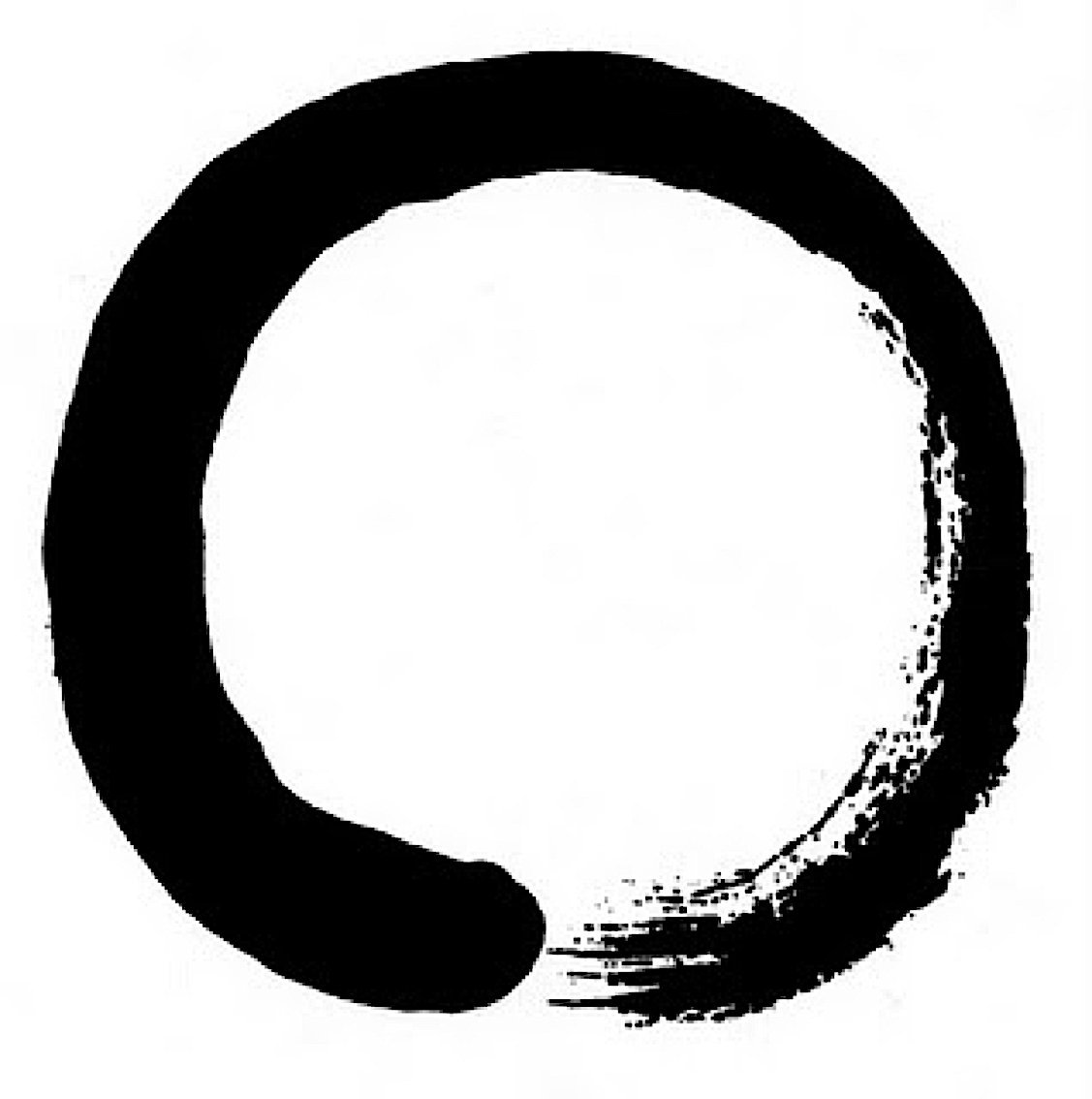
Mapping the Mind
Kant was essentially trying to ‘map the mind’ while also considering the existence of a universal, objective reality outside of the self. However, he ultimately concluded that the noumenon can never be known. A lot of philosophers have written since Kant, of course, but his formulation of the mind was transformative for Western Philosophy and has shaped much of the current trends in more recent Postmodern Philosophy and Theory. But, what might a response to Kant from Zen Buddhism look like. Let’s take a well-known and very influential Zen monk and a great philosopher in his own right, like Dōgen Zenji, author of the Shōbōgenzō. I argue that Dōgen would agree, in part, with Kant’s assessment, especially the idea that there exists an ultimate reality most of us are not aware of or have not experienced directly.
However, Dōgen might reply that it is true that there is an ultimate reality, but that it can be experienced directly and by everyone, since all of us are endowed with Buddha nature: we just need to awaken to it. Dōgen would further assert that rather than experiencing it through reason, we must experience it directly through Zazen by pacifying the mind, or, perhaps more correctly by noticing our thoughts and not attaching to them. Only then can we ‘see’ ultimate reality. And, further, that ultimate reality is not ‘out there’ separate from us, but that it is one-in-the-same and is us: we just need to become aware of it.
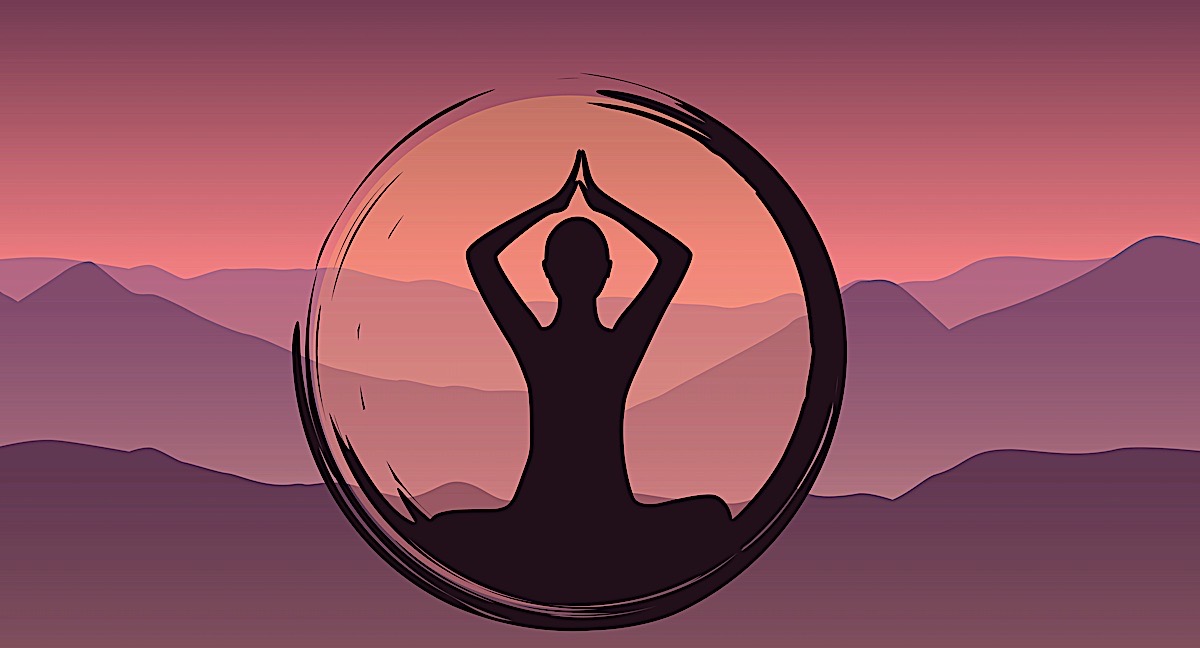
Kant believed that humankind could encounter rare glimpses of the ‘ultimate’ when confronted with something that is powerfully ineffable, impressively magnificent, and beautifully terrifying (or terrifyingly beautiful?). In other words, something that is so extraordinary and remarkable that it simultaneously evokes feelings of beauty and terror, i.e. a glimpse of the infinite and a subsequent feeling of the sublime. For example, we might encounter an awe-inspiring feeling at the summit of a mountain precipice that is stunning but also somewhat scary. Kant believed this had to do with a failure of the imagination—a kind of cognitive failure—which would lead to an emotional response that forces us back into relying on reason to sort it all out. This is where Kant and Dōgen diverge most profoundly. Dōgen, like most Zen masters, would suggest that reason is entirely incapable of sorting this out. The only way to grasp it is without thought—no mindedness—via Zazen. This is where things get a little complicated and ‘dicey.’ Dōgen says, for example, that to practice Zazen means “Think of not-thinking. How do you think of not-thinking? Non-thinking. This in itself is the essential art of non-thinking.”[9] It seems to me that this, in a conceptual sense, means that that non-thinking tries to pierce through the duality of thought vs. no-thought, thinking vs. not-thinking. It is essentially Śūnyatā or emptiness; it is the awareness of consciousness itself; that there is no distinction between the self and the universe. From the Heart Sutra:
Form here is only emptiness;
Emptiness only form.
Form is no other than emptiness;
Emptiness no other than form.
Feeling, thought, and choice—
Consciousness itself—
Are the same as this.[10]
Paradoxes Characteristic of Zen
Here, we can see in one of Buddhism’s fundamental texts, the paradoxes so characteristic of Zen Koans and Zen practice. The rational mind cannot make sense of this; we must grasp it directly without thinking; that is via Zazen. But, is this realization the same as an experience of the sublime that we see in Western Philosophy? Is enlightenment a sublime experience? Is an experience of the sublime ‘true enlightenment’?
Kant’s notion of the sublime has been profoundly influential in Western philosophy and is still relevant today in various new formulations from Jean-François Lyotard to Julia Kristeva to Slavoj Žižek. But one idea I find most interesting in terms of its possible parallels to Zen is what I would call a ‘side-effect’ of the sublime, or what the contemporary Irish philosopher William Desmond calls perplexity: “The more one thinks, the more one is overcome by ontological perplexity.”[11] For Desmond and many recent thinkers, philosophy is the well-spring of curiosity, astonishment, and perplexity—especially in regard to deep metaphysical questions like those about being and existence; i.e. ontological ones. Philosophical inquiry, in other words, leads to more questions and more perplexity. The inquiry itself brings us to that Kantian moment of awe. This corresponds to the practice of Zen in interesting ways: one of the most important realizations in my own practice of meditating with Koans has been understanding the importance of the act of questioning; it is the process of inquiry itself that is most significant, not necessarily the ‘answer.’ Zen pushes us to wonder about the universe and our place within it. So does philosophy. It is worth noting, also, that the study of philosophy is often what brings people to their Zafu in the first place: perplexity begets curiosity, curiosity begets questioning, questions beget great doubt, which pushes us to explore different paths in an attempt to discover (or uncover) answers.
‘Doubt’ is fundamental to Zen practice. Along with great faith and great determination, great doubt is one of the Three Essentials of Zen. ‘Great Doubt’ is, admittedly, quite different than philosophical skepticism, and the opposite, perhaps, of cynicism.
Nonetheless, it embodies a spirit similar to the deep metaphysical skepticism about reality and self-identity exhibited in some corners of Western philosophy. In both, there exists a skepticism about the way we think things are, fundamentally, and the way we confuse perception with reality. Both offer a way to deeply question human perception and knowledge, as well as the operations of one’s own mind, and, ultimately, force us to question our beliefs and, thereby, challenge dominant or rigid ways of thinking about reality and the self.
Character & Ethics
Besides exploring fundamental questions about the nature of mind, reality, and knowledge, philosophers explore multiple other issues about human experience: politics, history, science, language, aesthetics, and ethics. It is this last one I will focus on now: ethics. The idea that meditation is all that one needs to live an ethical and moral existence is rather idealistic and, I think, quixotically hopeful.
Philosophy, then, might serve as a great companion to Zen Buddhist practice when applied to day-to-day reality or, as Kant referred to it, the phenomenal world. In other words, it is indispensable for a discriminating mind: for application in ethics, worldly affairs, and quotidian reality—the world we live in on a day-to-day basis. However, is it useful in achieving enlightenment? Probably not. Certainly not in any direct way. But, can it be helpful in a more circuitous way? Perhaps.
Eightfold Path of Buddha
Consider the Noble Eight-Fold path and, particularly, the first four: right understanding, right thought, right speech, and right action. The fourth element of the Four Noble Truths, the Eightfold Path is an integral and inextricable part of most Buddhist sects; it is a necessary component of practice and the way in which we, as Buddhists, attempt to manifest and enable the wisdom that is revealed in the practice of meditation. The Eightfold Path is all about ethical conduct and moral behavior including, for instance, avoiding lies, acting in a dignified and honorable way, and, more generally, abstaining from speech or actions that cause others (and ourself) harm. The Eightfold Path reveals a way of life that presumably brings us closer to realization through thought and action: it goes hand-in-hand, so to speak, with meditation. The Eightfold Path is a system of ethics and moral contemplation similar to certain aspects explored in Western philosophy. In this way, philosophy can certainly inform or even bolster Buddhist practice, especially for practitioners who reflect very deeply about morality and ethics or for those who might struggle with the right action or behavior in a particular circumstance.
Clearly, all human beings are fallible: including Buddhists who are advanced in their practice. Philosophy might be one of the possible ‘tools in the toolbox’ to help make ‘repairs’ when needed and to help us act ethically, and, thereby, cause less suffering: it can be part of the Eightfold path. We are constantly confronted with moral and ethical challenges throughout our lives. This has become even more obvious in a world still reeling from the global pandemic and worldwide social, political, and economic strife. As Roshi Robert Aitken has said, “the function of Zen is the perfection of character. We are not merely solving intellectual riddles.”[13] So, why shouldn’t we employ all the tools available to confront such a tumultuous world?
Bridging Cultural Difference
One of the challenges facing Zen and Buddhism in the West has always been reconciling elements of the practice and religion that are culturally bound and deeply Asian and attempting to square them with Western cultural norms and standards. Philosophy can help in building a bridge between the two cultural paradigms. Philosophers help us navigate our own thinking and challenge us to be skeptical about claims regarding truth, knowledge, and reality; and, philosophers force us to question our own motives and presuppositions and challenge us to consider what is personal and cultural versus universal and essential. In more recent philosophy, this also includes being skeptical of the very existence of anything essential and universal at all; or, what Jean-François Lyotard calls transcendental signifiers like God or ultimate reality.
Philosophy not only adds to our wonder and astonishment about the universe and our own minds, but it also helps us ‘disconnect’ from hardened beliefs, rigid cultural dogmas, and potentially erroneous ideological presuppositions. Philosophical thoughts do not ‘throw sand in the eyes of the intellect’ like Zen, but they do have the potential to disrupt delusional thinking in other ways. Philosophical ‘thought experiments’ and, a different, but connected recent trend in philosophy called ‘experimental philosophy’ do just that: use puzzling experiments, hypothetical scenarios, and seemingly intractable ethical situations to test and question existing beliefs about the world.
Conclusions
The connection between Zen and philosophy is, as you can see, somewhat fraught. However, the potential for philosophy to enhance one’s practice and compliment meditation and Zazen is rich if one proceeds, as the Eightfold Path tells us, with samma sankappa–right thought and right intention. In addition, we should consider another important concept in Zen Buddhism: the notion of upaya or ‘skillful means.’ Just as the Buddha seems to have gone to great lengths to adapt his teaching to his various students, we must consider multiple ways of reflecting, experiencing, and understanding deeper spiritual truths in a way that is appropriate and expedient for the circumstances. This means reading (and philosophizing) with a clear purpose and with a penetrating mindfulness. It means making reading part of one’s practice: different and unique but not separate or external to it. It means remaining aware when both cognitive and emotional attachments arise. It also means being leery of the way in which we become reactive in our thoughts, ideas, and emotions about certain ideologies and philosophies rather than responding to them in a measured and mindful way.

As stated above, Roshi Philip Kapleau suggests that Zen and reading do not ‘in general complement each other.’ Yet, he leaves room for the possibility that they might—if practiced mindfully and with a clear and different intention than Zazen. He seems to concur when he states that “indiscriminate reading must be abandoned, not all reading; these activities (e.g. reading psychology, for instance, if you are professional psychologist) should be considered part of your zazen.”[14] Kapleau worries that reading philosophy, especially about Zen and enlightenment “is like scratching an itch through your shoe…. it clogs the mind with sticky concepts and notions.”[15] I cannot dispute this, yet as I argue above, philosophy has the potential to enrich our lives and help us live and act more compassionately. It also has the potential to assist in dislodging delusional, erroneous, or mistaken beliefs. Additionally, it is worth noting that separating philosophy from Zen contributes to dualistic thinking, which is fraught in other ways and includes its own set of negative consequences. Mindful philosophical inquiry, on the other hand, or philosophy that is made part of one’s practice, can augment and bolster Zazen. Let me be clear: I do not think philosophy should ever replace the meditation, but, if we study philosophy in a purposive way alongside Zen, the benefits to our practice might be profound.
So, let’s consider the image of the snow globe again. Shake it and there’s an instant snow squall like our minds: a dizzying array of swirling thoughts. When the snow settles, we see the scene again with intense clarity. The objects become clear, discernable, unhindered. But it is the blizzard that makes us appreciate that clarity even more than if it was never there in the first place. In other words, a perfect metaphor for this seemingly tense, conflicted relationship between Zen and philosophy. Or as Stevens might put it: the two minds of winter, the blizzard and what comes after.
Notes and Citations
[1] Stevens, Wallace. Collected Poems of Wallace Stevens. New York: Alfred A. Knopf, 1954. (Online: https://poets.org/poem/snow-man).
[2] In What is Philosophy? (Columbia University Press, 1994), Deleuze and Guattari assert that “philosophy is the art of forming, inventing, and fabricating concepts” (page 2).
[3] This can be confirmed fairly easily with a cursory search on Amazon, but more reliable sources abound: Sam Hamill’s preface to The Poetry of Zen begins with a quotation from D.T. Suzuki: “Zen is a matter of character, not a matter of intellect.” And, in response Hamill writes, “And yet there are probably tens of thousands of readers of Zen books for everyone who has experienced Zen.” Sensei Koshin Paley Ellison of the New York Center for Contemplative Care says something similar in his course description on Zen History: “It is said Zen is the school of Buddhism that is beyond words and letters. Yet, the Zen school has more texts, poetry and art than any other!” But, whether there are precisely more books written on Zen than any other misses the point: suffice it to say, there are a lot of books written about Zen despite the fact that many Zen masters throughout history declare that it is beyond words.
[4] Kapleau, Philip. Zen: Merging of East and West. Anchor Books, 1980. (Page 29)
[5] ibid
[6] Keown, Damien. A Dictionary of Buddhism, Oxford University Press, 2003.
[7] Discursive is an interesting word here and very Zen-like because of its inherently contradictory definitions. It is, essentially, a contranym or a ‘Janus Word’ because its definition includes its opposite. It means both ‘aimless, digressive, rambling,’ and ‘proceeding by reason and argument.’
[8] Kant, Immanuel, Critique of Pure Reason, trans. Norman Kemp Smith. New York: St. Martin’s Press, 1964. (pp. 152-153).
[9] Dōgen. Fukanzazengi (p. 123); Zazengi, (p. 128). Trans. by Nroman A. Waddell and Masoa Abe. The Eastern Buddhist. Vol. VI, No. 2 (1973).
[10] The Heart Sutra (aka Prajñāpāramitā-Hṛdayam or Heart of Perfect Wisdom) is perhaps the most well-known of the Ancient Buddhist texts. In this Sutra, Avalokiteśvara, the Buddha of compassion, addresses Śariputra in order to explain the condition of all phenomena as emptiness (śūnyatā). There are multiple translations. The one here is from the Rochester Zen Center’s pamphlet for practice: Chants & Recitations.
[11] Desmond, William. Perplexity and Ultimacy: Metaphysical Thoughts from the Middle, SUNY Press, 1995.
[12] Victoria, Brian Daizen (2006), Zen at War (Second ed.): Rowman & Littlefield Publishers. (Online: https://www.greenshinto.com/2016/04/02/zen-and-shinto-12-martial-connections/)
[13] Aitken, Robert. The Gateless Barrier: The Wu-Men Kaun (Mumonkan). Farrar, Straus and Giroux, 1991.
[14] Kapleau, Philip. Zen: Merging of East and West. Anchor Books, 1980; page 28.
[15] Ibid, page 25-27

